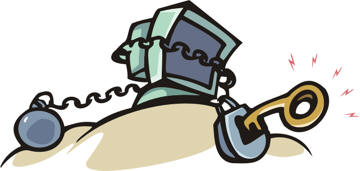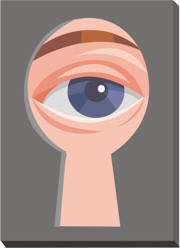The Social Media
Dilemma
By Barrington H.
Brennen, October 1, 2014
“Those disgusting relatives of mine, how could they have
put my photo on social media without my permission?
Why can’t they respect my wishes?" Is there really
something wrong with publishing a friend’s photos on an
online social media without the person’s permission?
Note carefully that if one is in a public place, there
is no expectation of privacy, no matter what you are
doing. However, when you are in a private place, home,
etc, it is inappropriate to publish a photo without
seeking permission.
Let me explain. If you are marching on a parade in
public it is normal to expect photographers,
professionals, and amateurs to capture the moment and
use it for publications or online social media. There
is nothing much you can do about that. However, if you
know the person photographed in public feels that the
moment or image captured is awkward or embarrassing, it
is wise to seek permission before publishing. You do
not want to ruin your relationship.
American Lawyer
Ruth Carter gives another twist to this that is somewhat
different than mine in her article “When Can You Post
Photos Online?” She says “If you’re in a public place
and someone snaps a picture of you while you’re falling
down drunk, getting arrested, picking your nose,
scowling at a crying baby, or not wearing pants, there’s
probably nothing you can do if that picture shows up
online somewhere. The exception to this rule is that
you have an expectation of privacy in places like public
bathroom stalls, changing rooms, tanning salons, and
doctor’s offices that may require you to be partially or
completely undressed.” Sometimes it is not just about
the legal requirements but simply about respect, honor,
and dignity.
If you are doing a story about someone in a formal
online or printed publication and want to use a caption
photo of the person, it is best you seek permission for
which photo to use. Some popular people establish
agreements with the media to only use certain types of
photos or particular photos. This is to be respected.
PRIVACY
 There
is another view regarding your private life and when you
are in your private world. Often parents are upset when
they see a photo of their newborn on a social media site
that was taken by a family member or friend. Although
the parents knew the photos were being taken, but how
the photos will be used are taken for granted. This
causes great discord in relationships.
There
is another view regarding your private life and when you
are in your private world. Often parents are upset when
they see a photo of their newborn on a social media site
that was taken by a family member or friend. Although
the parents knew the photos were being taken, but how
the photos will be used are taken for granted. This
causes great discord in relationships.
Some family
members have the audacity to think that since they are
relatives or older and wiser, they do not need to seek
permission to use the photos publically. With the
increase use of social media I think it is wise to say
to persons with a camera, smart phone, or iPad, who are
visiting you what your expectations are about photo
taking and privacy. You can inform the family members
or visitors either not to take photos or when to take
photos, or not to use any photo taken outside their own
private world without your permission. Do not take for
granted that they already have that understanding.
Unfortunately, some people have no scruples.
With the worldwide use of so many social media sites
people have become camera crazy. They seem to enjoy
taking photos and putting them online without
discretion. This is not wise. There should be
consideration for the person’s privacy and dignity.
Social media is being used to remove the privacy
boundaries. It shows a lack of respect. We must
realize that once a photo is online it can be seen
around the world. It is gone, gone, gone. Do you want
that part of your private life to be public? You should
be wiser in informing people about your expectations who
are taking photos of you, your children, or other family
members while in your private space. No one has a
right to walk in your private home and take a photo and
release it to the world without your permission. Not
even your mom, dad, siblings, close friends, and other
relatives.
WEDDING AND FUNERALS
Many years ago mostly professionals took photos at
weddings and funerals. The use of photos was under
control and was seldom abused. Today, with the use of
cheap digital cameras, smart phones and iPads, the
church aisles are often ridiculously padded with eager
photographers snapping their favorite moments. Many
leave these funerals or weddings feeling that they have
the license to use the photos when they want to. As
stated earlier, they might be right, but the
photographers are to be wise. Placing a photo on your
social media site might not be the desire of the
family. They may not want to be exposed in that way.
So what do we do? Perhaps someone should announce at
the funeral or wedding that there will be no photo taken
or no photo should be published online without
permission. Once this is stated the photographers are
to abide by it. The notice can also be printed in the
brochures.
SENSITIVE TIMES
There are intimate moments a couple may want to capture
on camera. What part does privacy plays in this case? Here’s what Ruth Carter
shares about this: “For example, if you and your
partner make a sex tape or take intimate pictures of
each other, there’s an inherent expectation that no one
beside you two would see them. If you break up, your
partner can’t post the pictures online and protect
themselves by saying that you never agreed to keep them
private.”
privacy plays in this case? Here’s what Ruth Carter
shares about this: “For example, if you and your
partner make a sex tape or take intimate pictures of
each other, there’s an inherent expectation that no one
beside you two would see them. If you break up, your
partner can’t post the pictures online and protect
themselves by saying that you never agreed to keep them
private.”
Perhaps, I need to repeat an important principle. Never
take for granted that the photographer, amateur or
professional, knows your expectation about privacy.
Also make sure you are proactive regarding photo
taking. Establish your own privacy rules for all
occasions and let the people know about it. If you do
not let them know, often there is very little you can do
about it. Also be careful about your behavior in
public. Photographer Ruth Carter says “Don’t do
anything in public that you wouldn’t put on the front
page of the newspaper.” This is no longer a private
planet but you can still keep your life private.
Barrington H. Brennen is a marriage and
family therapist and board certified clinical
psychotherapist, USA. Send your questions or comments
to barringtonbrennen@gmail.com or
write to P.O. Box CB-13019, Nassau, The Bahamas, or
visit www.soencouragement.org or
call 242-327-1980 or 242-477-4002